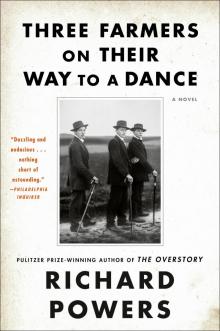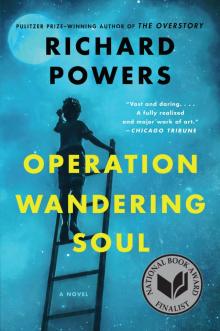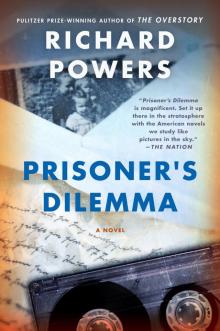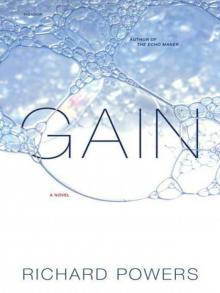- Home
- Richard Powers
Operation Wandering Soul Page 2
Operation Wandering Soul Read online
Page 2
He checks his watch, and then the light from a window, to determine whether that’s A.M. or P.M. He crawls on all fours back to his call room where he rummages about for some reading material, some pictorial literature to numb him to sleep. But big-time humor: Plummer and the ER boys have raided all the call room’s Penthouses and replaced them with Rifle & Handgun Illustrateds.
Well, deal with it; he’s in no shape for fictively intimate biographies anyway. And he’s had enough anatomy, God knows, to last his body a lifetime. So he settles into the May R & H, getting no further than the inside cover. A four-color ad: “Take the Law into Your Own Hands.” Play on words, see. “The Law” is the name of this little semiautomatic honey. Portentous as the come-on is vis-à-vis cultural decomposition, the spread does yank onto center stage of Kraft’s consciousness the question that’s been banging about the greenrooms of his cerebellum over the last few weeks. Shouldn’t he perhaps get hold of a small arm too, by way of acknowledging the law of averages?
His lone survival trick to date has been to maintain a subterranean profile, to duck under the immediate median. He’s got nothing of retail value stashed at his apartment. His moody ten-speed. Last epoch’s TV, not even VCR-ready. Record player, if you can believe. Two original oils of the Abyss that he couldn’t give away. No self-respecting filcher of any nationality is going to bother riffling the dust. Should some enterprising addict crowbar into the place by accident, transposing numbers in the address CB’ed him from Thrashers’ Central Dispatch, he’d run from Kraft’s postholocaust decor as from a pestilence house. A pistol at the apartment would be as superfluous as any other major appliance.
Fact is, he does not actually go back to his place these days except to pay the utils. He’s never spent much time there, and that’s tended toward nil ever since he became resident Resident here at Hole of Calcutta Public.
But away from home, here at Carver, reality’s numbers are worse than he ever suspected, even in his gloomiest extrapolation. He sees the daily tabulations snaking in human conga lines longer than the most competent admitting nurse can hope to tag and transfer. They amble at him in those cloth shoe-wraps, merging into a multilane free-for-all as amorphously adrift as any expressway. Pimply adolescent gang partisans, assaulters, assaultees, half the underage world winds up in his pediatrics ward. Conscripts of collapsing infrastructure, their gear of choice: Kalashnikov, AK-47, Uzi, even M-16, a tool whose recent sales surge attests to Bob Hope’s TV ads about buying homegrown and minding the balance of trade. “You better believe it makes a difference.”
And Carver gets only those wounds that are potentially closeable. Kraft’s eyes have opened some, living out here in the cash-and-carry neighborhoods, the ones that have been literally fueling the economic transformation miracle, the ones that pick up the tab for the whole ethos of buy now, pay elsewhere.
Why should he sit still and wait for the inevitable? Mornings, this nascent desire to buy a gun seems a silly flare-up, a surrender to his country’s prize paranoia. The return of collectively repressed foreign-policy fantasies, writ small. But nights, nights like this one, flipping through the ER boys’ practical jokebook while the steady sirens of Incoming wail away like a chorus of Aidas in the tomb, arming oneself seems a case of simple arithmetic. Do the long division: kill ratio into population density. He’s not going to last the twenty weeks. He’ll be popped walking down to the parking lot, or plugged lazily from the left-hand freeway lane.
The prospect of five more months at this place upends whatever residual progressive sympathies of his survived the Scuttle-and-Run decade. He doesn’t need the law in his hands. But a little something in the glove compartment by way of rebuttal? Until such a day as the law stops eating its own?
He slinks off into REM-free sleep, passing through the stages of non-ness without a spike. At four A.M., they break into his room and begin to pound him awake. Six-year-old kid whose gut he sewed up two days ago tore it open tonight on a recap nightmare. Some save-the-world decides that the repair has to be enacted immediately. And Kraft’s on call. Go willingly, or be dragged kicking and screaming into that good nightmare? Fifteen minutes after coming more or less conscious, he’s sewing. A little peritonitis cocktail greets him, so it’s just as well they’re back in. As he snips and whisks, the OR radio all the while pipes a little background tune, “Get It Right the First Time.”
Afterward, there’s no point in even trying to salvage the idea of sleep. Grand Rounds in a couple hours, after the day’s opener, the Morbidity and Mortality conference. He can at least attempt to doze through M and M, that weekly proverbial chocolatey mess. But what to do now, now, now? Keep the pace—matter in motion. He’ll go wake Plummer from the dead and demand his magazines back.
But Dr. Thomas is up and long since in the trenches. The ER looks like the war zone it is. A chaos of attendings—Milstein, Garber, even Flores—a couple anesthesiologists, scrub nurses running in and out, and Kraft’s man himself standing frighteningly composed with his hands horribly enlarged on the TV monitors, poking about in somebody’s lumbar, bouncing around flecks of metal confetti like slap shots at the puck in that little boys’ table hockey. Kraft rescrubs and checks out the scene.
Plummer greets him, grinning, Cheshire. Always the last anatomical bit to disappear. “See those cops up in the observation gallery? They’re waiting to charge this guy with the sexual battery of a woman. I’d like to be charged with the sexual battery of a woman. How ’bout yourself, Dr. Krafty? Say, uh, as long as you’re scrubbed and not doing anything to justify your existence . . .”
Kraft stands dumbly, makes him spell it out. “Would you mind bailing for a bit, buddy? Here; just hold this thread. It’ll only take a minute.”
LESS THAN A month of seniority at this outfit, and he’s already garnered a reputation. Not just a reputation, which might have been damage-controllable. Kraft’s saddled with several. Interesting how a person’s public persona varies so insanely from service to service. Whole behavioral morphologies erupt from first impressions and a gentle audience nudge. He finds it too tough to disabuse people of their pet projections. Infinitely flexible, Kraft is. That is, cowardly by another name. Comes from having grown up all over the globe. No matter; for half a year, he can sustain any personality anyone might type him with.
Something about him must emanate this Mr. Potato Head plasticity. Chief of Surgery Burgess, dying a slow, half-century death in this city where reading span is sorely stretched by the instructions on microwave popcorn, instantly imagines that in Kraft he has found a kindred literate spirit, a simile son. Dr. Purgative, as Plummer rechristens him, keeps farming out these convoluted, epistemological novels by Kraft’s obscure, young contemporaries. Plow through and report on, over sherry this afternoon, a postmodernist mystery thicker than the Index Medicus where the butler kills the author and kidnaps the narration. Damn thing includes its own explanatory Cliffs Notes halfway through, although the gloss is even more opaque than the story. What the hell; it’s a break from booking for the next wave of board exams.
At the same time, Dr. Milstein, pediatric attending, has been led by Kraft’s enthusiastic head-bobs to believe that the new floater resident is a great sailing buff. The man running-bowlines Kraft outside the cafeteria, presses him for a date when they can head out to the islands on Milstein’s thirty-seven-footer. Kraft falls back on the ingenious perfect put-off: “I’ve got call all week.” That gives him time to get out to the nearest Books-’n’-Stuff to secure a how-to manual. Between Purgative and the Millstone, it’s quite the contretemps keeping Madeira straight from port straight from starboard.
Of the remaining permanent staff, Drs. Kean and Brache—Father Kino and Miss Peach—seem to want him for a whipping boy, a willful child in need of restraint. When we were residents, they used to stick us with hatpins until we suppurated. Loved every minute of it. Made us the exemplary physicians you see before you. Spare the rod and spoil the ortho. Well, no, we don’t really need you to
do seventy-two continuous hours of call. Oh, so you can’t do three T-and-A’s, a small bowel, an appendix, and a gallbladder in one day? Of course, if you want to go into family practice, we can always write some nice letters of rec for you. With these folks, Kraft grins a lot and asks for second helpings of everything they dish out.
And the pede nurses: the sweet cheats somehow conclude, based perhaps on Kraft’s baby-face, beardless, brown-eyed prettiness, that he is totally depraved. Whatever the objective truth in that, he cannot match their own aptitude on this score. He skirts past their station on rounds; one of them says into the phone, “Wait a minute. He’s just passing. I’ll put him on.” She hands him the receiver and hello, hello? It takes a minute to realize that they’ve connected him to Dial-a-beat-off, and there’s this growling feminine monstrosity on the other end beseeching him with weird invocations to zipper her skin. Another ward nurse locks him in the supply closet with her, makes him watch as she downs massive doses of cold medicine, then demands to be wrapped in seventy-five yards of surgical gauze. “Come on. Like I’ve been dead a hundred thousand years and you just happened across me in some pyramid?”
To Tommy Plummer, whom Kraft worked with at Kaiser across town, he is a conspiratorial, blasé fellow-sufferer. Your patient, Doctor. Survival requires, as they gather for Morbidity and Mortality, that the knot of his fellow residents, all fast approaching Jesus Christ’s age at crucifixion and still in school, hover together by the coffee machine (vicious substance; inotropic agent and elevator of them gastric juices), compare massacre stories and crack bad-taste jokes about the jelly bismarks offered up for public sacrifice. Ritual fortification for the coming ordeal, when they must one by one stand up in front of the assembled surgery staff and announce: forty-two admissions, thirty-three discharges, five complications, one serious. One fatality. And say why they lost that case.
Kraft takes the spotlight, begins the lowdown on a chart that, by the slimmest of roulette-spun grace, stayed on this side of the pale, kept him from having to announce a fatality for his service this week. No blame to itemize; an instructive combination of anomalies, really. Nobody could have anticipated, before opening the kid, that we’d find . . .
Father Kino, the meeting’s weekly host, cuts him off. “What ever made you think you could do elective surgery on a child with a potassium level that low?”
Well, how low is low? Isn’t that context dependent? I mean, are there guidelines at this hospital for suitable . . . ?
“No one cuts unless K-level is normal. That’s N-O-R—”
Yes, but I wouldn’t have thought . . .
“You didn’t think. That’s the problem. Consequently, you very nearly killed this boy. As it is, do you know what you’ve condemned him to for the next sixty years?”
The monotone recital of probable complications drowns out the slighted protestant in Kraft, the voice in the wilderness screaming, You slimy self-righteous son of a bitch. April 23. Robinson, fifty-one-year-old black male. Guy comes in with kidney stones and goes out on a platter. Your patient, Dr. Kean. Kraft ejects the internal heckler in him at the first impulse to shout. Letting himself feel anything, least of all legitimate rage, is self-destructively futile. They have all the emotions countered, covered. Say so little as I made a judgment call, and you’re wiped all over the canvas.
Kean really gets into the whole TV-doctor shindig, baiting him, waiting for him to utter the first whimper of self-defense. When Kraft refuses to give in to anything but the bare minimum Hippocratic contrition, Father Kino issues a mock absolution that falls flat over the entire room: “Go and sin no more.”
Plummer corners him afterward. “Nice show, Dr. Kraft. What ever possessed you . . . ?” The rib incorporates a complex mix of sympathy and further abuse. What ever, indeed. Why put up with this horseshit harassment? Five years of eighty-hour weeks at half the salary of a bank loan officer, an aggravated sense of galloping inadequacy and a running ulcer, annihilated private life, dosed out on the varieties of punitive torture, all for the privilege of being publicly humiliated. Where did it take hold, that public-service conviction, the sense that he personally had to hold back the tide of human slaughter? Where did it come from, the terrified certainty that he’d end up squalid and starving to death in the gutter unless he amassed the thickest bullet-proof moral bankroll known to man?
He tries to breach the subject with Burgess, by way of evading the latest, unfinished assignment for the week’s literary chat. “Moses complex?” Burgess suggests, all but stroking his goatee. The Chief clearly missed his calling. What’s a talking-cure guy doing wielding the big knife?
It earns Kraft hard currency with the boss to lay out the effects of an adolescence in transit on his adult sense of security. He says how continuous military-brat mobilization had him hit all the globe’s hot spots by puberty. He spins out the case study of how, by ten, he’d left friends behind on each of four major landmasses. Even with Burgess as lay analyst, Kraft has to lie a little, invent an incriminated mechanism. Make up some plausible cathartic insight into his getting mixed up in a calling for which he never displayed the least vocation, a life of self-denial he could happily have sidestepped, a messianic stopgap that early experience should have told him was ludicrously irrelevant.
Did he never, Burgess probes, dream of a career more adventuresome, more expansive? Well, yes. For years, little Kraft carried with him, three and a half times around the globe, despite the vicissitudes of local politics, his transposing horn. Somewhere deep in the AP archives, a grainy black-and-white glossy shows a scared foreign-service band, evacuated from Lahore at the start of the ’65 war to the region’s rock-solid American bastion, Teheran. In the poignant foreground, Ricky Kraft, doing his brave little John-John Jr. salute, clutches a French horn case as if it contained the tune the sick world was dying by inches to hear.
The following year, in British Guiana, as it overhauled itself into Guyana, Ricky made his first child’s assault on Mozart. By Djakarta, overblowing had taken him into the high registers. As late as his two 2-year stints in what passed for accredited high schools, the terms “valve,” “tubing,” and “bore” still possessed not the slightest of health-professional overtones.
Simplicity came apart in a single night. That arctic year, back stateside, when it became clear that the energy crisis was not a temporary embargo. The year the president invoked one oxymoron, “the moral equivalent of war,” against another oxymoron, “contemporary behavior.” The year his father engineered his last international mission.
Bitterly frigid, a February beyond speaking. Four in the afternoon and already pitch black. A twenty-year-old stood on Huntington Ave outside the conservatory, waiting for the Arborway back to his chill flat in Jamaica Plain. His hand froze through his glove to the metal case handle, his breath vapor iced to the hairs of his upper lip, solidifying on contact with air. At that instant, he heard something—cracking mortar between the stones of the building he leaned against, the tensing of the rail at the approach of the trolley, the sounds of an old man being attacked with a baseball bat off toward Roxbury. With that noise—the sound of absolute zero—he would never be able to get warm again in this country.
At his apartment, the power had been out for hours and the pipes had burst. Geysers of water stood in midair, spectral faucet turbulences, ossified, Midased in place. Lying under every blanket he owned, their weave as slack as a stroke victim’s mouth, the crystal interstices in his window glass thrown wide open to the outdoors’ single-minded cold, Kraft remembered his way to a decision.
The age of music was over. He could play no longer. His horn uncoiled to its unmanageable seven feet. By semester’s end, he cashed in his worthless education and headed home to his father, who had chosen North Dakota, the coldest, bleakest, emptiest state in the Union, to be a widower in. There, he slept for six months, shivering out the coma. Waking, Kraft began applying at once to pre-med programs.
Start again, from scratch. Better a few year
s late than eternally unprepared. University fell, then med school—four years in a pressurized bathyscaphe. Every test was a dry run for the Final Exam, whose hour no man could know but was coming eternally closer, its sole question already cribbed in that one afternoon’s sickening presentiment. Assisting at his first coronary bypass, helping to clamp off and excise the saphenous vein from the meat-thick thigh and substitute it for the fouled canal-locks around the heart, Kraft felt only the placid terror of arrival. Not safe, not even here. But the operating theater was as central a station as any in which to wait for that obscure appointment laid out for him.
Even in residency at the most southerly hospital he could break into, the French horn accompanies him, superfluous baggage he’s sworn off of but can’t deep-six. It sits in its case, arm’s length from his unfrequented bed, awaiting that postponed jam session of itinerant orchestra, midnight’s clandestine musicians riffing into cleanly earned, twelve-bar sweat over sweet surreptitious saints marching someplace in.
And that’s why he’s a surgeon, Dr. Burgess. What does he win? Reasons, he would tell the Chief, explain nothing. Peculiarly American, this doctoring up of motive after the fact. The M.D. gives him something to fall back on; why not leave it at that?
Only overwork mitigates the sense of rendezvous, perpetually about to be missed. And this job’s busier than any in the accepted register. He gives none of this away during Burgess’s sherry-and-lit sessions. One does not tell the head of surgery that the career is just a holding pattern. Still, the Chief’s got a spot of it too. Cold consolation of supercompetence: earn a breathing space, prolong more lives than one terminates, bilge a patch of the spreading hematoma, nick the parabola, buy a minute, which must be sixty seconds more than nothing.
THE HALLWAYS SWARM with interns today. Each one grins at him from behind a patient work-up, inquiring politely after his potassium level. Kraft, after weeks of running this rat maze and still capable of getting lost in it, follows the colored-floor-stripe Baedeker, the No-Pay’s heritage trail, deep into pathology’s sanctum sanctorum.

 The Overstory
The Overstory Bewilderment
Bewilderment Three Farmers on Their Way to a Dance
Three Farmers on Their Way to a Dance Operation Wandering Soul
Operation Wandering Soul Prisoner's Dilemma
Prisoner's Dilemma The Gold Bug Variations
The Gold Bug Variations Generosity: An Enhancement
Generosity: An Enhancement The Echo Maker
The Echo Maker Orfeo
Orfeo The Time of Our Singing
The Time of Our Singing PLOWING THE DARK
PLOWING THE DARK Generosity
Generosity Gain
Gain